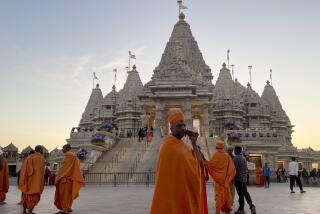‘This is our life and soul’ : Hare Krishnas Find Friends in Neighbors : Sect: The Laguna Beach temple may be forced to close by a multimillion-dollar judgment against the national branch. Residents who once opposed the devotees now offer their support.
- Share via
LAGUNA BEACH — Even in this city that swears by its diversity, the Hare Krishna have not always blended easily into the community’s patchwork.
Over the years, members of the Hare Krishna temple here have annoyed residents with late-night chanting and squared off against the city over the right to hold celebrations on crowded Main Beach. There was a drug scandal that rocked the temple in the late 1970s and a lawsuit by a Cypress teen-ager who alleged that she was brainwashed into joining the sect.
But now, with the possibility that the temple may be closed because of a multimillion-dollar judgment against the Hare Krishna U.S. branch, devotees here are finding moral support among their neighbors.
Next month, the U.S. Supreme Court will decide whether to hear the case of Robin George, who along with her widowed mother sued the sect in 1977 and was awarded $32.5 million by an Orange County Superior Court jury. The jury had found the sect guilty of “brainwashing,” “mind control” and “false imprisonment.”
Although an appellate court reduced the judgment to $5 million last August, Hare Krishna leaders have said even the lesser amount would force them to close some of their American temples, including the one here.
To be sure, there are some in Laguna Beach who would be happy to see the Hare Krishnas leave.
Still, there are others who have changed their opinions over the years about the temple and its devotees. One neighbor even wrote to U.S. Supreme Court Justice Sandra Day O’Connor recently on their behalf.
Helen Roberts, 92, who has lived across the alley from the Krishna temple for 20 years, said the devotees used to be a nuisance. But, she said, over the years they have become helpful friends, bringing meals to her home when she was not well enough to go out.
“I don’t know what I would do if they would leave,” she said. “Everybody seems to favor them now and like them so much.”
The shift in attitude is, in part, a result of the temple’s decision five years ago to open Gauranga’s Gourmet Vegetarian Dining, which now serves more than 75 customers a day. Some residents say devotees have simply been good neighbors.
Maria Price-Testa, who rents three apartments to devotees from the temple, said the Krishnas are fastidious, responsible and quick to pay their rent. They provide a “fantastic civic service,” she said, by running the only vegetarian restaurant in town and by offering $3 meals for senior citizens.
“I’m not the usual cloth-shoes person, and I still like them because they are fulfilling an aspect (of community service) that is not fulfilled by anyone else,” she said.
“In this day and age things are different than they were earlier, simply because we have all grown up,” said Govinda, the 43-year-old woman who now manages the temple on the corner of Glenneyre and Legion streets, where devotees fill their days praying, gardening and preparing vegetarian meals.
New leaders and temple devotees have worked hard to rebuild the Hare Krishnas’ reputation and to find a niche in the community, she said. Every day, she said, devotees pray that they will be able to stay in the town where they feel they are now largely accepted.
“My dear Lords Sri Panca-tattva, if you so desire, please keep all of Your temples open for your devotees,” reads a framed plea propped next to the collection box in the temple’s largest room, where more than 200 worshipers typically gather each Sunday.
The prayer is repeated by devotees each morning, in response to their “current problem,” Govinda said. Devotees have made many sacrifices to keep the temple open, and to lose it now would be a bitter blow, she said.
“This is our life and soul,” she said. “At this point, we really don’t know what we would do.”
Dan Crary, a former full-time devotee who now lives with his wife and baby just down the street, said the loss of the temple would be a “tremendous tragedy.”
“I was here when we purchased this building, and it was just an old, run-down Baptist Church,” he said. “It would be obviously a great waste to have to begin all over again.”
Krishna devotees still take their religion to the streets, Govinda said. Every Sunday, a group of devotees chant and sing on Main Beach. While people still make fun of them, devotees don’t mind because they believe that anyone who hears the “vibrations of chanting” will eventually be changed by it, she said.
But for the most part, devotees busy themselves about the temple, rising as early as 3:30 a.m. to chant and pray from 4:30 a.m. until 8 a.m.
Hare Krishna devotees vow not to use “intoxicants,” including coffee, tea and cigarettes. They do not eat meat, fish or eggs. They do not gamble. They abstain from any sex not intended for procreation.
Much of the daily activity at the temple revolves around the restaurant, which serves a $5, all-you-can-eat luncheon from 11:30 a.m. to 2 p.m. and a $6 dinner from 5 to 8:30 p.m. Monday through Saturday.
Diners can eat such fare as stir-fry vegetables or legume soup and freshly baked bread. They can take their meals on the lawn outside the temple, in one of two small eating areas inside or on mats flung beside small tables in the main worship room. During lunchtime, the life-size, hand-carved deities are screened off from diners.
While Govinda, who also is treasurer of the temple, would not comment on the income of the restaurant, she did say receipts from the eatery pay the largest portion of the temple’s bills. Other income comes from the sale of books and donations from worshipers, she said.
The purpose, Govinda said, is not to become “some mega-business interest,” but to offer food which can “change a person’s heart and make him more receptive to understanding God.”
Two Laguna Beach residents leaving the restaurant on a recent weekday, Joan Weiss and Shirley Leitch, said they eat at the temple about three times a week because devotees offer tasty vegetarian meals at reasonable prices and do not force-feed their religion.
“They don’t proselytize, which is what I really appreciate,” Weiss said. “We have so many strata of people here and they’re all compatible.”
More to Read
Sign up for Essential California
The most important California stories and recommendations in your inbox every morning.
You may occasionally receive promotional content from the Los Angeles Times.













